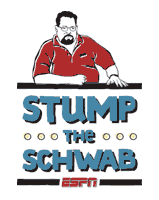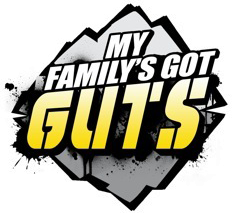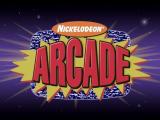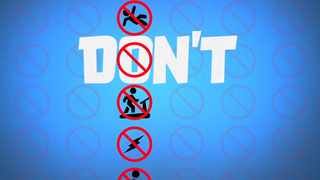Related Research Articles
Guts or disc guts is a disc game inspired by dodgeball, involving teams throwing a flying disc at members of the opposing team.

What Would You Do? is a 30-minute television show hosted by Marc Summers shown on Nickelodeon from 1991 to 1993. Robin Marrella acted as the on-camera stagehand for the show's first season. Both Summers and Marrella performed their respective duties on Double Dare, also on Nickelodeon. The show was produced in Nickelodeon Studios at Universal Studios in Florida; some early segments were produced at Universal Studios in Hollywood.

Think Fast is an American children's game show which aired on Nickelodeon from May 1, 1989, to March 30, 1990, with reruns airing weekly until June 29, 1991.

Fun House is an American children's television game show that aired from September 5, 1988, to April 13, 1991. The first two seasons aired in daily syndication, with the Fox network picking it up and renaming it Fox's Fun House for its third and final season.

Stump the Schwab is an American game show that aired on ESPN2 and ESPN Classic from July 8, 2004 to September 29, 2006. The show featured three contestants trying to defeat Howie Schwab, ESPN's first statistician, in a sports trivia contest. Stuart Scott was the show's host. The show also appeared on Canada's The Score Television Network.

Nickelodeon Guts is an American television action sports competition series hosted by American actor/writer Mike O'Malley and officiated by English actress Moira "Mo" Quirk. The series originally ran from 1992 to 1995 on Nickelodeon.
Secrets of the Cryptkeeper's Haunted House is a children's Saturday-morning game show that ran on CBS. It premiered on September 14, 1996 and lasted until August 23, 1997. It featured the Cryptkeeper of Tales from the Crypt now serving as an announcer. It is the last TV series in the Tales From the Crypt franchise. The series was taped at Universal Studios Florida.

Family Challenge is an American game show that aired on The Family Channel from October 2, 1995 to September 7, 1997, lasting for two seasons. Reruns aired on Game Show Network from April 3 to September 25, 1999.
Slime Time is a syndicated game show, running on Saturdays from June 11 to September 3, 1988. It was created to cash in on the success of Double Dare, and was very similar to that show. The host was comedian Marty Cohen, who hosted each episode dressed as a referee and the show was announced by Dean Goss.

X-Man (Korean: X맨) was a popular South Korean game show which ran from November 8, 2003 to April 8, 2007 on SBS. Its popularity peaked from 2004 to 2006. It was hosted by Yoo Jae-suk, Kang Ho-dong, Kim Je-dong, with Kim being successively replaced by Gong Hyung-jin, Park Kyung-lim, and Lee Hyuk-jae; only the first two were on the program since its inception.
Tokyo Friend Park 2 is a Japanese game show that premiered in April 1994 on the Tokyo Broadcasting Station (TBS). TFP2 airs on Monday nights roughly from 6:55 - 7:54 JST in Japan.

My Family's Got Guts is a family game show that aired on Nickelodeon. It was a revival of Guts, and aired from September 15 to September 27, 2008. The show was taped in Sound Stages 23 and 24 at Universal Studios Florida, housing the Extreme Arena and the Aggro Crag, respectively. Stage 21, where the original Guts program taped, was most recently occupied by production of Impact Wrestling. This version is hosted by Ben Lyons and officiated by Australian celebrity Asha Kuerten. It was the first Nickelodeon production to be produced at Universal Studios Florida since the closing of Nickelodeon Studios in 2005. For unknown reasons, season 2 never aired in North America. However, the season would air in its entirety in other countries.

Nick Arcade is an American children's game show created by James Bethea and Karim Miteff and hosted by Phil Moore, with Andrea Lively announcing, that aired on Nickelodeon in 1992, airing originally during weekend afternoons, with reruns airing until September 28, 1997. It was taped at Nickelodeon Studios at Universal Studios Florida in Orlando. In Nick Arcade, two teams of contestants played two initial trivia rounds, with the winner advancing to the "Video Zone" to play against the virtual "Video Game Wizard" of the day.
Escape from Scorpion Island is a BAFTA-nominated BBC children's TV adventure game show in which contestants compete to "escape from an exotic island". Series 4 was produced by Foundation/Freehand for CBBC and the Australian Broadcasting Corporation.
Knights and Warriors is an American competition television program that premiered in syndication on September 19, 1992. The program aired on weekends for one season, with episodes airing until September 11, 1993. The show was a production of Welk Entertainment Group, and was distributed by Western International Syndication.
Family Game Night is an American television game show based on Hasbro's family of board games and EA's video game franchise of the same name. The show was hosted by Todd Newton. Burton Richardson was the announcer for the first two seasons; he was replaced by Stacey J. Aswad in the third season, and Andrew Kishino was hired for the fourth season. The 60-minute program debuted on October 10, 2010, on The Hub ; it was previewed on October 9, 2010, on its sister channel, TLC. Seasons 1 and 2 contained 26 and 30 episodes respectively. Seasons 3, 4 and 5 each contained 15 episodes. Season 2 premiered on Friday, September 2, 2011, with additional games being added. The games added to the second season included Cranium Brain Breaks, Green Scream, Ratuki Go-Round, Simon Flash, Operation Sam Dunk, Trouble Pop Quiz, and Spelling Bee. However games from the previous season were still kept.
Japanizi "Going, Going, Gong!" ("ゴーイング、ゴーイング、ゴング!") is a Canadian children's physical game show with a Japanese motif where contestants compete with a teammate against other teams as they tackle obstacles and challenges to test their mental capabilities, strength, endurance, and smarts. The series first aired on YTV starting 5 November 2013 and in the United States on Disney XD as of 4 November 2013.
The Grudge Match is a 1991 syndicated television game show that invited feuding people to settle their issues in a boxing ring using various implements of revenge.

Don't is an American comedic physical game show that aired on ABC from June 11 to August 13, 2020. The show was hosted by Adam Scott. Ryan Reynolds served as an executive producer and commentator. The show features teams of four trying to accomplish various tasks to win up to $100,000. In April 2021, the series was canceled after one season.

All Star Shore is an American reality competition streaming television series that premiered on Paramount+ on June 29, 2022. It is a successor to Jersey Shore that features television stars from around the world as they live together in a villa in Gran Canaria, Spain, to compete for $150,000.